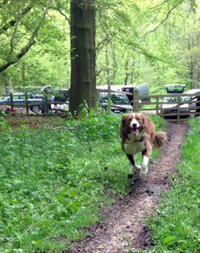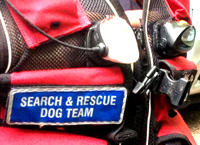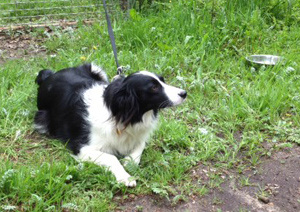Search and Rescue – woodland searches, dogs and toys

David is a volunteer dedicated to saving lives. For nine years now he and his dog have been working with Hampshire Search and Rescue who deal with about 60 call-outs each year. This can be for children who've got lost or run away or for dementia sufferers who've forgotten where they live and are wandering around commons or woodlands. Recently his team spent three days looking for an Alzheimer's sufferer and eventually found her 50 miles from her home, alive and quite well.
"The key objective," explains David, "is to find the missing person as quickly and efficiently as possible. When we are testing people who've been trained we expect a lot of them - they have to find three bodies in 50 acres within half an hour. Actually 7 % of missing people are found within 30 metres of a track or road."
I met David at Hyden Wood which is managed by woodlands.co.uk and we welcome Hampshire Search and Rescue to use this woodland for training sessions. At the time of our encounter David was "pretending" to be a lost person while a trainee was looking for him with a sniffer dog, probably downwind of him. Many breeds of dog can be used for this. David's own dog, Kip, is a border collie and is specially trained for search and is amazingly obedient - responding to voice commands, a whistle or to hand signals (his dog can't always hear commands because of wind and other noise, so she needs to be able to recognise hand signals). When she does smell a body, often over 100 metres away, it's described as a "strike" and Kip will tense up, prick up her ears and head straight for it. As soon as David joins her with the "find" he will reward her, even if she's not found the person they are looking for. He gives her a squeaky toy as the reward, although others often use food rewards. For Kip the whole thing is a game and she is looking for the person in the belief that they have taken her favourite toy.
 Organised search and rescue in lowland areas has only been going for about a dozen years whereas mountain rescue is 100 years old, but increasingly police forces are relying on these trained volunteers. While I was with Hampshire Search and Rescue, I met a visiting policeman from Avon and Somerset police who was there to understand how it all works so that he can work with them more effectively. Often these search organisations are mentioned in news stories but usually fairly anonymously with phrases like "specialist search teams...". I ask David if he minds doing something so high profile but getting little recognition for it: he says he's quite happy, although the high cost of petrol does make running these organisations tough to finance. They do fundraising, and recently got National Lottery funding for a trailer. Some people say they should be government-funded, while others say it's a "big society thing".
Organised search and rescue in lowland areas has only been going for about a dozen years whereas mountain rescue is 100 years old, but increasingly police forces are relying on these trained volunteers. While I was with Hampshire Search and Rescue, I met a visiting policeman from Avon and Somerset police who was there to understand how it all works so that he can work with them more effectively. Often these search organisations are mentioned in news stories but usually fairly anonymously with phrases like "specialist search teams...". I ask David if he minds doing something so high profile but getting little recognition for it: he says he's quite happy, although the high cost of petrol does make running these organisations tough to finance. They do fundraising, and recently got National Lottery funding for a trailer. Some people say they should be government-funded, while others say it's a "big society thing".
The darker side of this search and rescue is finding "despondents" who are often clinically depressed or even suicidal.  Although finding a body is never fun, doing it speedily does help the family and friends and often such people can be found in time to be helped. The search and rescue teams will frequently call in air support and ambulance services. There is also lots of cooperation between the search and rescue services of different counties and indeed the whole thing has a thriving social side - these volunteers have common interests in dogs, in being outdoors and, most importantly, in saving lives.
Although finding a body is never fun, doing it speedily does help the family and friends and often such people can be found in time to be helped. The search and rescue teams will frequently call in air support and ambulance services. There is also lots of cooperation between the search and rescue services of different counties and indeed the whole thing has a thriving social side - these volunteers have common interests in dogs, in being outdoors and, most importantly, in saving lives.
Comments are closed for this post.
Discussion
I am so impressed with the dedication of these teams, and I love following the dogs on twitter ;-)


They do a lot of good work, in their own time and at their own expence, which may mean loss of wages. So glad we have them in Hampshire.
Chris
15 November, 2012